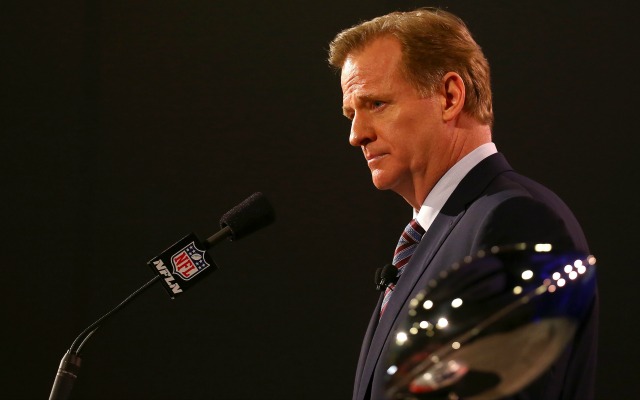
In a memo to the league's ownership groups on Tuesday, NFL commissioner Roger Goodell announced that the league office and Membership Council would be ending their tax exempt status and filing returns as taxable entities for the 2015 fiscal year, the first time since 1942 they will do so. Here are a few things to know about that change and what it means.
1. The memo
Bloomberg's Scott Soshnick obtained a copy of the memo Goodell sent to the league's owners and posted it online. Here is the full text:
TO: All Owners
All Presidents
FROM: Commissioner Goodell
DATE: April 28, 2015
SUBJECT: Tax Exempt Status
As you know, for several years the NFL has discussed the tax exempt status of the league office and the Management Council, and more than a year ago the Finance Committee began a study of whether to relinquish the exemptions. That study has now concluded, and has confirmed that a change in the tax status will not alter the function or operation of the league office or Management Council in any way. At the Annual Meeting in March, the full ownership granted the Finance Committee and Management Council Executive Committee (CEC) the authority to change the tax status of the league office and the Management Council. I write to report to you that last week each committee exercised that authority and voted to have the league office and Management Council file tax returns as taxable entities for our 2015 fiscal year.
The league office was first granted tax-exempt status by the IRS in 1942, and the IRS has repeatedly confirmed that status over the years. The Management Council has a similar tax status and organizational structure. As you know, the effects of the tax exempt status of the league office have been mischaracterized repeatedly in recent years. The fact is that the business of the NFL has never been tax exempt. Every dollar of income generated through television rights fees, licensing agreements, sponsorships, ticket sales, and other means is earned by the 32 clubs and is taxable there. This will remain the case even when the league office and Management Council file returns as taxable entities, and the change in filing status will make no material difference to our business. As a result, the Committees decided to eliminate this distraction.
Recently Congress has questioned whether sports league associations should, as a matter of federal tax policy, be tax exempt. We will notify interested members of Congress of this decision by NFL ownership.
2. The practical effect
The big note in the memo is this: "As you know, the effects of the tax exempt status of the league office have been mischaracterized repeatedly in recent years. The fact is that the business of the NFL has never been tax exempt. Every dollar of income generated through television rights fees, licensing agreements, sponsorships, ticket sales, and other means is earned by the 32 clubs and is taxable there. This will remain the case even when the league office and Management Council file returns as taxable entities, and the change in filing status will make no material difference to our business. As a result, the Committees decided to eliminate this distraction."
As Goodell alluded to, the NFL has operated as an unincorporated nonprofit 501(c)(6) since 1942, with the league office not subject to tax because it does not make a profit. Instead, income was distributed to each of the league's 32 teams, who were taxed on it themselves. The NFL considered itself a trade association made up of and financed by its 32 member teams due to this structure.
Ending the tax exempt status will likely have very little monetary effect on the league itself, especially because the NFL is sure to make some structural changes to limit the tax liability of the league office in reaction to the change.
Here's a note from a Reuters article from March about this very subject:
Andrew Delaney, a sports law expert with Martin & Associates, said if it became a for-profit entity, the NFL would likely find enough write-offs to offset the savings it would lose along with its tax-exempt status.
"When MLB made the switch from a non-profit, they reported that there was no real change in their tax liability," he said. "If I were running the NFL show, I'd say, 'This isn't worth it.' It's not worth the PR hit it takes."
It is telling that Goodell referred to the league's tax exempt status as a "distraction," which indicates that the league office was more concerned with the optics and media reaction to it remaining tax exempt than with the actual effects of no longer being an untaxed entity.
3. One thing that will change
Because it will no longer operate as a tax exempt entity, the NFL will no longer be required to publicly disclose the commissioner's salary. Goodell's $44 million salary became a point of public contention as the league dealt with various scandals throughout the last year. The league could still elect to disclose his salary in future years, but that seems rather unlikely.





















